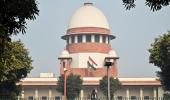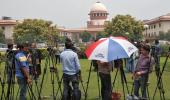Irked over the minimal use of technology, the Supreme Court on Friday said no high court in the country shall deny access to video conference or hearing through hybrid mode to lawyers and litigants after two weeks and made clear that technology now is not a matter of choice for judges.

"The question is not whether a particular judge is tech friendly. If you want to be a judge then you have to be tech-friendly. It is like how a judge can say that I do not know what 'res judicata' (a common legal principle which says one cannot claim judicial relief twice in one case). Every judge in the system has to be trained," a bench comprising Chief Justice DY Chandrachud and justices J B Pardiwala and Manoj Misra said while issuing a slew of directions to ensure that hybrid mode of hearings in all high courts are not disbanded."
"Technology is no longer a matter of choice for judges," the CJI said.
The top court drew parallel between driving and technology and said if one doesn't know how to handle technology then he or she can't be a judge and questioned the approach of some of the high courts.
"After the lapse of two weeks from this order, no high court shall deny access to video conference facility or hearing through hybrid facility to any member of the bar and litigants," the bench said in one of the directions
It issued several directions for extending the facilities for hybrid mode of hearing across 25 high courts and tribunals.
The bench directed all the state governments to provide necessary infrastructure for ensuring smooth functioning of hybrid mode of hearings in all high courts.
"Adequate facilities like WiFi be made available free of charge to advocates and litigants appearing before the high courts," it said.
The video conferencing links must be made available in the cause list of the concerned court itself and there should be no requirement to make a separate application to appear through virtual mode, it said.
It also directed all high courts to put in place a standard operating procedure for litigants to avail access to hybrid/video conferencing hearings within four weeks, it said.
The bench expressed concerns over poor internet connectivity in north eastern states and ordered: "We direct the Union IT Ministry to ensure internet connectivity to courts in north eastern states to ensure access to online hearings."
Referring to the grant of Rs 7,000 crore fund by the Centre, the bench said that the technology has to be upgraded and not disbanded.
"I am sorry to say that some high courts are tech-indifferent. I have been pushing the chief justices...every high court must make available video conferencing facilities. No judge in the high court shall decline hybrid," the CJI orally observed.
The top court, which had sought the response of high courts and tribunals on whether they have disbanded the hybrid mode of hearing cases, then took up the replies of high courts one after the another.
"The Allahabad High Court is a complete offender. The infrastructure has been completely shut down," the CJI said while expressing anguish over the reluctance in using technology.
The CJI was also unhappy with the Bombay High Court and asked as to why it has almost disbanded the video conferencing infrastructure.
"Now Bombay, you have disbanded the infrastructure... This is my parent high court and I am distressed to say that the hybrid is mode done away with," the CJI said and asked as to how many screens have been removed.
Justice Chandrachud said in a city like Bombay, travel is also difficult. "Technology is not a matter of choice. Technology is as much a part of our legal system as much as law books. Without technology, how do we function," the bench said.
It also asked the central ministries to hold a meetings with the chairpersons of the NCLT and NCLAT to thrash out the funding aspect and ensure that the hybrid mode of hearings become fully functional.
"The National Company Law Tribunals and the NCLAT shall ensure that all steps are taken to ensure that hybrid hearings can be held at the option of the litigant no later than four weeks," it ordered.
Additional Solicitor General KM Nataraj told the bench that the National Consumer Disputes Redressal Commission and the National Green Tribunal are holding hybrid hearing in Delhi and its regional benches.
It also directed the high courts to put in place the standard operating procedures (SoP) for availing access to hybrid or video conferencing hearings in four weeks.
It also appointed lawyers Gaurav Agarwal and K Parmeshwar as amicus curiae to assist in future hearings and asked them to directly connect to the registrar generals and the registrar IT of all the high courts.
The bench asked them to go through the replies of the high courts and cull out details for the convenience of the court so that adequate directions can be passed.
It asked Delhi high court judge Rajiv Shakdher to frame the SoP on hybrid hearings with the help of amicus curiae and share the document with the high courts.
It took note of the fact that some high courts including the Himachal Pradesh and Uttarakhand high courts have not filed their replies and warned that their registrar generals and the registrar IT will have to appear personally if non-compliance continues.
Earlier, the top court on September 15 had sought the response of all the high courts and some tribunals on whether they have disbanded the hybrid mode of hearing cases.
It had also asked Solicitor General Tushar Mehta to seek instructions from the finance ministry and other ministries on the status of hybrid hearings at the Debt Recovery Appellate Tribunal, debt recovery tribunals and other such quasi-judicial bodies.
The apex court took note of the submissions made by petitioner Sarvesh Mathur, who appeared in person, that the Punjab and Haryana High Court has stopped virtual hearings, which is causing inconvenience to the litigants.
"Thank you for bringing this to our attention. We will do something for the cause, which we were thinking about for a long time. We will ask the high courts who have disbanded virtual hearings. You have brought to the notice of the court a very important issue. We are seeking a response from all the high courts and some tribunals to see what the status is," the bench told the petitioner.











 © 2025
© 2025